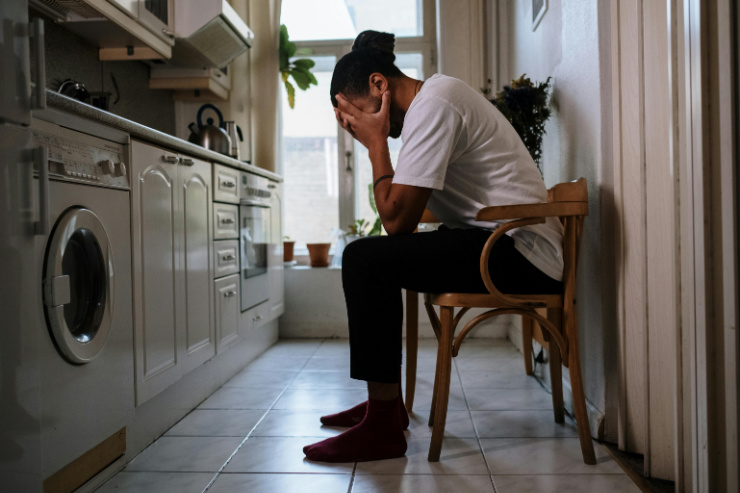In this post, let’s explore what Agoraphobia is, how it is different from social anxiety and, most importantly, what people can do to manage it effectively by getting the support they need.
What is Agoraphobia?
Agoraphobia is an anxiety disorder characterized by several fears which involve the avoidance of places or situations to escape a feeling of panic, being trapped or that help may not be available if needed.
Agoraphobia for many people is triggered when they are on public transportation, in crowded places, standing in a queue or in vastly open spaces. They may feel like they cannot leave these situations, or that it may be too embarrassing to do so. This may result in a panic attack.
What Is The Cause Of Agoraphobia?
The exact cause of agoraphobia is unknown. However, a stressful event such as the loss of a loved one, divorce or losing your job can trigger agoraphobia, as can pre-existing mental illnesses. Women are more likely than men to develop agoraphobia.
Symptoms Of Agoraphobia
Intense anxiety and panic attacks are common symptoms for those suffering from agoraphobia. That feeling you get when you think something bad is going to happen, butterflies in your stomach, hyperventilation and an increased heart rate. So much so that fear of these triggers may cause them to avoid going to certain places or being in certain situations.
This avoidance behaviour can have a negative impact on the quality of their lives as they cannot do what they normally would, such as socializing with friends, going for walks in the park, and taking public transport which are everyday behaviours.
Agoraphobia vs. Social Anxiety
Many people confuse Agoraphobia with social anxiety because some of the symptoms overlap, but they are actually very different anxiety disorders with different triggers. Agoraphobia is a fear of being in a certain situation or place that may be difficult or embarrassing to leave, whereas social anxiety is a fear of social interactions and that of being judged by others.
People with agoraphobia may suffer from anxiety or panic attacks in certain situations, whereas those suffering from social anxiety experience anxiety and panic attacks in social situations.
The avoidance behaviour is also different. Those with agoraphobia will avoid specific situations or places, whereas those with social anxiety may avoid public speaking or social gatherings.
How to Manage Agoraphobia
Living with agoraphobia can be challenging, but the good news is that there are several ways in which people can manage their symptoms depending on the severity.
Seeking Professional Help
Firstly, it is important to receive a diagnosis of agoraphobia. To do this is best to consult with a mental health care professional who can make an accurate diagnosis such as a psychiatrist or therapist. Cognitive-behavioural therapy (CBT) and exposure therapy are recognised as effective treatments for agoraphobia. Slowly, over time, those suffering from agoraphobia can confront and overcome their fears.
What Medication is Available for Agoraphobia?
In some cases, antidepressants or anti-anxiety medicine may be prescribed to help manage the symptoms of agoraphobia if they are severe enough to interfere with daily life.
Antidepressants or selective serotonin reuptake inhibitors (SSRIs) which may be prescribed include sertraline (Zoloft), or fluoxetine (Prozac). Anti-anxiety medications include benzodiazepines which have a sedative effect and reduce feelings of panic and anxiety. It is important only to take these medications under professional care as they can become addictive.
Practice Relaxation Techniques
Practising relaxation techniques such as meditation or deep breathing can help people with agoraphobia cope with their feelings of anxiety and panic. If practised regularly, they can also help to reduce the intensity and frequency of anxiety and panic attacks.
Gradual Exposure
Building your self-confidence with your emotions is one way to gain control over your agoraphobia. Slowly exposing yourself to the places or situations which may trigger you and facing your fears can help you to become desensitised to them and overcome them. This should only be done in small steps and ideally with a strong support network and professional help from a therapist.
Building a Support Network
A strong support network is important when you suffer from agoraphobia. Surrounding yourself with people who understand you can lift a weight off your shoulders. This could be in the form of friends or family, but if you feel this is not something they “get”, there are support groups and therapists who will understand. Connecting with others who experience agoraphobia can help you feel less alone and can motivate you to face difficult situations with reassurance and encouragement.
Don’t Let Agoraphobia Stop You from Living Your Life
Agoraphobia is a debilitating anxiety disorder that can make everyday tasks challenging, but this does not mean you cannot get help. You can get the help and support you need to manage your symptoms and regain control of your life.
This begins with seeking help from trained professionals who can help you slowly expose yourself to situations in which you would be fearful until you can overcome them. Practising relaxation techniques also help, and building your support network so you do not feel alone and isolated is important.
So, if you are struggling with agoraphobia, or know someone who is, you do not need to suffer in silence. Help is out there. Don't hesitate to reach out to a mental health professional or support group for assistance and guidance on the journey to recovery, so you can continue to live your life.
*AD








No comments